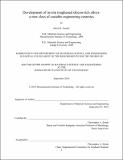| dc.contributor.advisor | Christopher A. Schuh. | en_US |
| dc.contributor.author | Fischer, David S., Ph. D. Massachusetts Institute of Technology | en_US |
| dc.contributor.other | Massachusetts Institute of Technology. Dept. of Materials Science and Engineering. | en_US |
| dc.date.accessioned | 2011-05-09T14:01:32Z | |
| dc.date.available | 2011-05-09T14:01:32Z | |
| dc.date.copyright | 2010 | en_US |
| dc.date.issued | 2011 | en_US |
| dc.identifier.uri | http://hdl.handle.net/1721.1/62616 | |
| dc.description | Thesis (Ph. D.)--Massachusetts Institute of Technology, Dept. of Materials Science and Engineering, February 2011. | en_US |
| dc.description | This electronic version was submitted by the student author. The certified thesis is available in the Institute Archives and Special Collections. | en_US |
| dc.description | Cataloged from student submitted PDF version of thesis. | en_US |
| dc.description | Includes bibliographical references (p. 174-180). | en_US |
| dc.description.abstract | Despite having a broad set of desirable properties, silicon's potential as a primary constituent in a structural material has not yet been realized because of its extremely low fracture toughness. Motivated by the microstructural design techniques used in toughening inherently brittle ceramic materials, this work aims to develop a silicon-rich alloy with microstructural features that provide for the same types of toughening mechanisms displayed by technical ceramics. In order to add true commercial value to these silicon-based alloys, however, the alloys must be processed using methods more flexible and less expensive than the powder processing routes currently used for engineering ceramics. This thesis will discuss the development of a class of castable silicon-based alloys referred to as silicon-disilicide (Si-XSi2) composites, which naturally form a microstructure composed of a silicon matrix and reinforcing disilicide (XSi2) phase during solidification (where X is a transition metal). Experimental work is performed to characterize the thermal, microstructural, and fracture properties of a specific set of Si-(Cr,V)Si2 alloys which are based on the Si-CrSi2-VSi2 system. First, a reliable thermodynamic description of the Si-CrSi2-VSi2 system is obtained, from which the relevant phase diagram is determined. Comparison between simulated solidification paths and experimentally observed microstructures demonstrates the use of the thermodynamic database to predict the phase evolution of the alloys during processing. Long-crack fracture toughness measurements made through chevron-notched beam (CNB) tests show that the toughness of the composite alloys are over 2-3 times that of unalloyed silicon, with in-situ tests revealing the role of microstructural toughening (via crack deflection and crack bridging) on the enhanced fracture properties. Ball-on-disk experiments reveal an order of magnitude improvement in the wear resistance of the alloys compared to silicon. This enhanced short-crack response is linked to the fine microstructural size scale of the eutectic structures, which allow toughening mechanisms to be activated during very early stages of crack growth. The range of fracture toughness and wear resistance values measured for the Si-(Cr,V)Si2 alloys elucidates the potential of these materials as viable structural materials in place of powder-processed ceramics. | en_US |
| dc.description.statementofresponsibility | by David S. Fischer. | en_US |
| dc.format.extent | 180 p. | en_US |
| dc.language.iso | eng | en_US |
| dc.publisher | Massachusetts Institute of Technology | en_US |
| dc.rights | M.I.T. theses are protected by
copyright. They may be viewed from this source for any purpose, but
reproduction or distribution in any format is prohibited without written
permission. See provided URL for inquiries about permission. | en_US |
| dc.rights.uri | http://dspace.mit.edu/handle/1721.1/7582 | en_US |
| dc.subject | Materials Science and Engineering. | en_US |
| dc.title | Development of in-situ toughened silicon-rich alloys : a new class of castable engineering ceramics | en_US |
| dc.title.alternative | New class of castable engineering ceramics | en_US |
| dc.type | Thesis | en_US |
| dc.description.degree | Ph.D. | en_US |
| dc.contributor.department | Massachusetts Institute of Technology. Department of Materials Science and Engineering | |
| dc.identifier.oclc | 717566993 | en_US |
